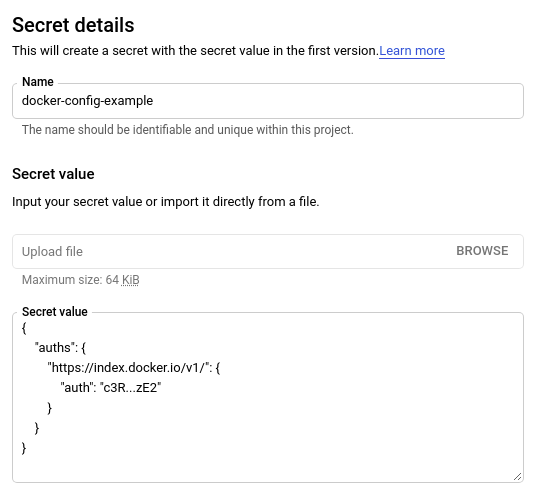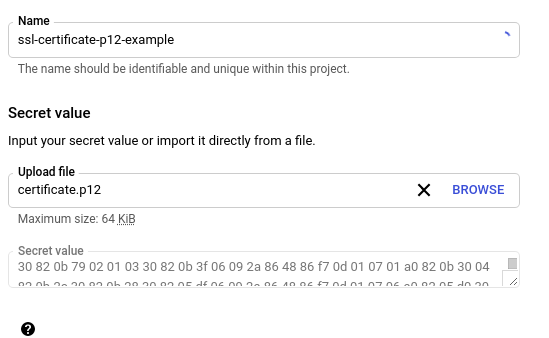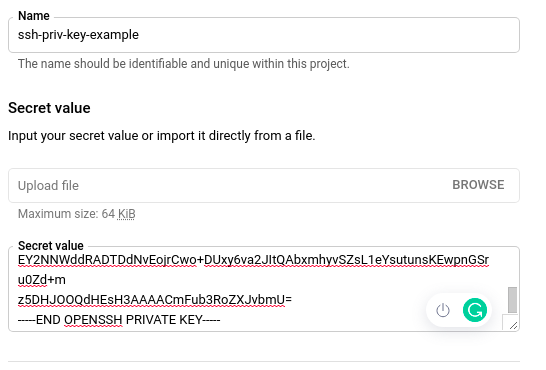A few common k8s secret types examples
Here we will give some examples of how to work with a few common k8s secret types. We will give this examples here with the gcp provider (should work with other providers in the same way). Please also check the guides on Advanced Templating to understand the details.
Please follow the authentication and SecretStore steps of the Google Cloud Secrets Manager guide to setup access to your google cloud account first.
Dockerconfigjson example
First create a secret in Google Cloud Secrets Manager containing your docker config:

Let's call this secret docker-config-example on Google Cloud.
Then create a ExternalSecret resource taking advantage of templating to populate the generated secret:
apiVersion: external-secrets.io/v1beta1
kind: ExternalSecret
metadata:
name: dk-cfg-example
spec:
refreshInterval: 1h
secretStoreRef:
name: example
kind: SecretStore
target:
template:
type: kubernetes.io/dockerconfigjson
data:
.dockerconfigjson: "{{ .mysecret | toString }}"
name: secret-to-be-created
creationPolicy: Owner
data:
- secretKey: mysecret
remoteRef:
key: docker-config-example
For Helm users: since Helm interprets the template above, the ExternalSecret resource can be written this way:
apiVersion: external-secrets.io/v1beta1
kind: ExternalSecret
metadata:
name: dk-cfg-example
spec:
refreshInterval: 1h
secretStoreRef:
name: example
kind: SecretStore
target:
template:
type: kubernetes.io/dockerconfigjson
engineVersion: v2
data:
.dockerconfigjson: "{{ `{{ .mysecret }}` }}"
name: secret-to-be-created
creationPolicy: Owner
data:
- secretKey: mysecret
remoteRef:
key: docker-config-example
For more information, please see this issue
This will generate a valid dockerconfigjson secret for you to use!
You can get the final value with:
kubectl get secret secret-to-be-created -n <namespace> | -o jsonpath="{.data\.dockerconfigjson}" | base64 -d
TLS Cert example
We are assuming here that you already have valid certificates, maybe generated with letsencrypt or any other CA. So to simplify you can use openssl to generate a single secret pkcs12 cert based on your cert.pem and privkey.pen files.
openssl pkcs12 -export -out certificate.p12 -inkey privkey.pem -in cert.pem
With a certificate.p12 you can upload it to Google Cloud Secrets Manager:

And now you can create an ExternalSecret that gets it. You will end up with a k8s secret of type tls with pem values.
apiVersion: external-secrets.io/v1beta1
kind: ExternalSecret
metadata:
name: template-tls-example
spec:
refreshInterval: 1h
secretStoreRef:
name: example
kind: SecretStore
target:
name: secret-to-be-created
# this is how the Kind=Secret will look like
template:
type: kubernetes.io/tls
data:
tls.crt: "{{ .mysecret | pkcs12cert | pemCertificate }}"
tls.key: "{{ .mysecret | pkcs12key | pemPrivateKey }}"
data:
# this is a pkcs12 archive that contains
# a cert and a private key
- secretKey: mysecret
remoteRef:
key: ssl-certificate-p12-example
You can get their values with:
kubectl get secret secret-to-be-created -n <namespace> | -o jsonpath="{.data.tls\.crt}" | base64 -d
kubectl get secret secret-to-be-created -n <namespace> | -o jsonpath="{.data.tls\.key}" | base64 -d
SSH Auth example
Add the ssh privkey to a new Google Cloud Secrets Manager secret:

And now you can create an ExternalSecret that gets it. You will end up with a k8s secret of type ssh-auth with the privatekey value.
apiVersion: external-secrets.io/v1beta1
kind: ExternalSecret
metadata:
name: ssh-auth-example
spec:
refreshInterval: 1h
secretStoreRef:
name: example
kind: SecretStore
target:
name: secret-to-be-created
template:
type: kubernetes.io/ssh-auth
data:
ssh-privatekey: "{{ .mysecret | toString }}"
name: secret-to-be-created
creationPolicy: Owner
data:
- secretKey: mysecret
remoteRef:
key: ssh-priv-key-example
You can get the privkey value with:
kubectl get secret secret-to-be-created -n <namespace> | -o jsonpath="{.data.ssh-privatekey}" | base64 -d
More examples
We need more examples here
Feel free to contribute with our docs and add more examples here!